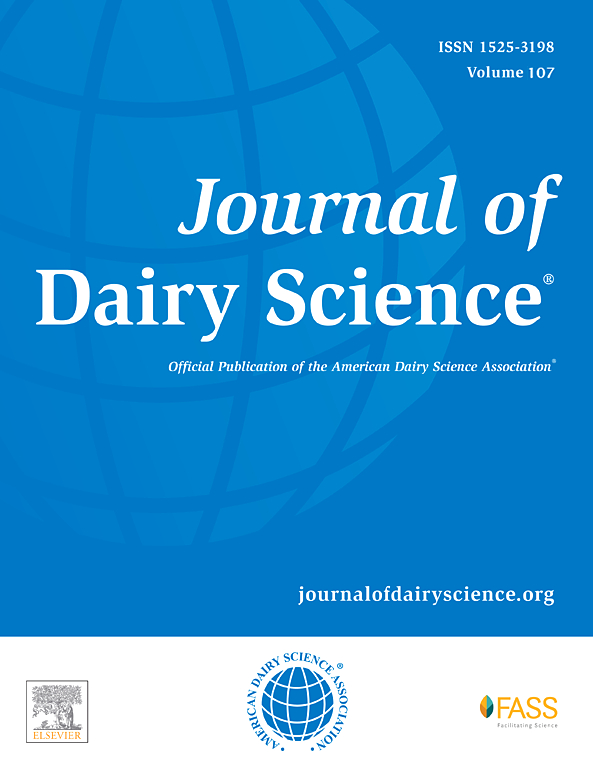Social housing for dairy calves: Farmer acceptance of Canadian industry-led requirements
IF 4.4
1区 农林科学
Q1 AGRICULTURE, DAIRY & ANIMAL SCIENCE
引用次数: 0
Abstract
Research suggests that housing milk-fed calves in pairs or small groups from a young age can provide welfare benefits, leading some policymakers to encourage dairy farmers to adopt this practice. For example, Canada's industry-led Code of Practice for the Care and Handling of Dairy Cattle requires social housing for indoor-housed calves, starting in 2031. We assessed acceptance of social housing and this new Code requirement by conducting 23 interviews with 13 farmers in Alberta and British Columbia, Canada. Interview questions were designed to evaluate 8 constructs (affective attitude, burden, ethicality, opportunity costs, perceived effectiveness, self-efficacy, and trust in the Canadian Dairy Code development process) derived from the “Theoretical Framework of Acceptance.” Participant acceptance varied, with some appreciating the benefits of social housing, and others citing concerns about the need for the requirement. Farmers generally thought they would be able to adopt social housing. Most participants prioritized concerns about calf health, but also considered calf socialization beneficial. However, some farmers also expressed frustration with the new Canadian Dairy Code requirement and did not feel their interests were represented in the Code development process. These findings highlight the need to address farmer concerns with new policies and practices, for example, through events that support farmers and their advisers to share successful approaches to implementation. Further research is required to better understand farmer views on representation in the development of policies that govern on-farm practices.
为奶牛提供社会住房:农民接受加拿大工业主导的要求。
研究表明,从小将牛奶喂养的小牛成对或小群饲养可以提供福利,这导致一些政策制定者鼓励奶农采用这种做法。例如,加拿大行业主导的奶牛护理和处理行为准则要求从2031年开始为室内饲养的小牛提供社会住房。我们通过对加拿大阿尔伯塔省和不列颠哥伦比亚省的13名农民进行23次访谈,评估了社会住房的接受程度和这项新法规的要求。访谈问题旨在评估来自“接受理论框架”的8个构念(情感态度、负担、道德、机会成本、感知有效性、自我效能和对加拿大乳制品规范开发过程的信任)。与会者的接受程度各不相同,一些人对社会住房的好处表示赞赏,而另一些人则对这一要求的必要性表示担忧。农民们普遍认为他们能够接受社会住房。大多数参与者优先考虑小牛的健康,但也认为小牛社会化有益。然而,一些奶农也对新的加拿大乳制品规范要求表示失望,认为他们的利益在规范制定过程中没有得到代表。这些发现突出表明,需要通过新的政策和做法来解决农民关注的问题,例如,通过支持农民及其顾问分享成功的实施方法的活动。需要进一步的研究来更好地了解农民在制定管理农场实践的政策时对代表性的看法。
本文章由计算机程序翻译,如有差异,请以英文原文为准。
求助全文
约1分钟内获得全文
求助全文
来源期刊

Journal of Dairy Science
农林科学-奶制品与动物科学
CiteScore
7.90
自引率
17.10%
发文量
784
审稿时长
4.2 months
期刊介绍:
The official journal of the American Dairy Science Association®, Journal of Dairy Science® (JDS) is the leading peer-reviewed general dairy research journal in the world. JDS readers represent education, industry, and government agencies in more than 70 countries with interests in biochemistry, breeding, economics, engineering, environment, food science, genetics, microbiology, nutrition, pathology, physiology, processing, public health, quality assurance, and sanitation.
 求助内容:
求助内容: 应助结果提醒方式:
应助结果提醒方式:


